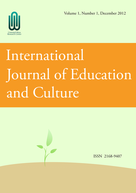


Volume 13 Issues 3-4 (2024-12-31)
Volume 13 Issues 1-2 (2024-06-30)
Volume 12 Issues 3-4 (2023-12-31)
Volume 12 Issues 1-2 (2023-06-30)
Volume 10 Issues 1&2 (2021-06-30)
Volume 9 Issues 3&4 (2020-12-31)
Volume 9 Issues 1&2 (2020-06-30)
Volume 8 Issues 3&4 (2019-12-31)
Volume 8 Issues 1&2 (2019-06-30)
Volume 7 Issues 3&4 (2018-12-31)
Volume 7 Issues 1&2 (2018-06-30)
Volume 6 Issues 3&4 (2017-12-31)
Volume 6 Issues 1&2 (2017-06-30)
Volume 5 Issues 3&4 (2016-12-31)
Volume 5 Issues 1&2 (2016-06-30)
Volume 4 Issues 3&4 (2015-12-31)
The purpose of this action research study was to examine the integration of assessment into the planning process as a means to improve learning. The sample was comprised of college students, enrolled in an undergraduate business program in a small, private, Western New York, university. The participants were registered for a required sophomore class in Consumer Behavior. A total of two sections were included both of which were taught by the same instructor who also acted in the role of researcher. The findings suggest an improvement in learning and a reduction in stress aligned with testing. In addition, these findings further add to Popham’s suggestion that tests, can be used to motivate students to learn.
Multiple choice questions (MCQs) are commonly used in higher education assessments and their use has increased alongside the availability of information and computer technology (ICT). MCQs are often considered an option to help deal with increasing numbers of students on distance learning and work-based learning. This study explores the perceptions of both lecturing staff and students on the use of MCQs in a higher education establishment in the UK. The survey findings indicate that, both academic staff and students tend to have a negative attitude towards the use of MCQs in higher education, although it was noted that MCQs may have a place in assessing knowledge. A recommendation of the research is that more time and resources should be invested to develop well–designed MCQs as a tool for providing formative feedback to students. Also, the use of ICT in distance or work-based learning may provide an effective means of assessing a diverse range of learners.